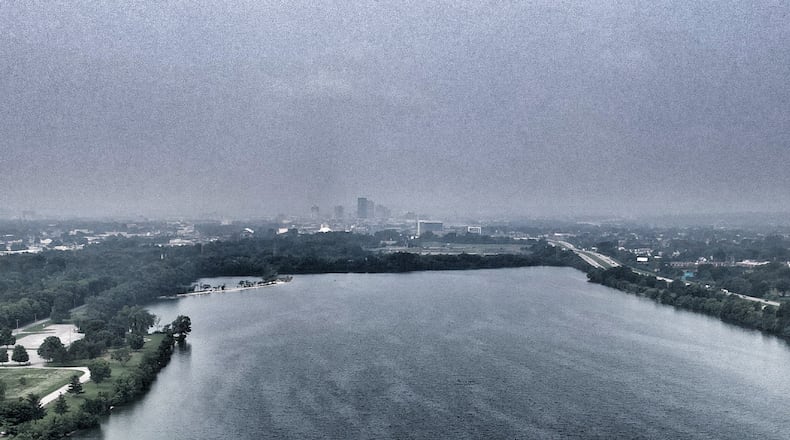Though multiple alerts have been issued this summer because of the wildfires, these types of alerts are uncommon.
Fine particulate matter, the type of pollutant caused by the wildfires that can be dangerous, rarely causes air quality alerts in the Miami Valley. The previous such alert before this summer was issued in 2018.
The Regional Air Pollution Control Agency is the Dayton region’s air quality center and issues alerts after pollution in the air measures over a certain threshold that is unsafe for the population.
“Prior to the month of June with the wildfires, we haven’t had a fine particle matter (alert) exceedance for probably five or six years,” said Brian Huxtable, pollution control specialist at RAPCA.
There have been air quality alerts for other reasons.
“Normally ozone is the primary pollutant of concern in the Miami Valley,” said Dan Suffoletto, Public Information Manager for Dayton and Montgomery County Public Health.
Ozone pollutants spike in the summer due to heat and sunlight mixing with oxides and compounds in the air, he said. Though alerts may spike in the summer, there is rarely cause for concern for the majority of the population.
“We normally don’t see ‘Unhealthy’ air quality levels in the Miami Valley ... but we usually experience between two and five ‘Unhealthy for Sensitive Group’ days each summer due to ozone,” Suffoletto said.
RAPCA follows the air quality every hour, updating the public with a daily forecast each weekday.
Their six ozone monitors and three fine particulate matter monitors work across five counties to update and send alerts to the public with changes in air quality.
“We really encourage people ... to watch the real-time air quality,” Huxtable said.
Residents are advised to remain vigilant with air quality alerts, especially if they fall into the sensitive group category.
“We traditionally only issue ... advisories to unhealthy or sensitive group populations. So, those are people with heart and lung disease, older adults, children ... basically anyone who would be in a susceptible group,” Huxtable said.
Members of sensitive groups are more likely to experience health effects at a lower air quality index level.
When alerts occur, residents are advised to shorten the amount of strenuous activity outside. The public can also assist in lowering air pollution when the air quality index is high.
“Don’t burn trash or yard waste. Keep vehicles and lawn equipment tuned-up and in good operating condition to reduce exhaust emissions,” Suffoletto said.
Nearby states are continuing to monitor issues as well.
The Michigan Department of Health and Human Services advised people in the state to check the Air Quality Index regularly to decide if they should be participating in outdoor activities.
The Indianapolis Office of Sustainability issued a Knozone Action Day for Sunday, saying people throughout central Indiana should avoid time spent outdoors as much as possible, especially active children, the elderly, anyone who is pregnant, and those with asthma, COPD (chronic obstructive pulmonary diseas), emphysema, heart disease or COVID-19. Sensitive groups should remain indoors Sunday and refrain from activities that degrade indoor air quality, including burning candles and vacuuming.
The Associated Press contributed to this report
About the Author


